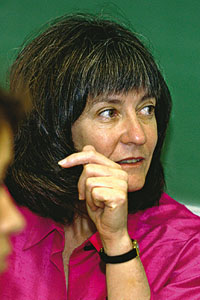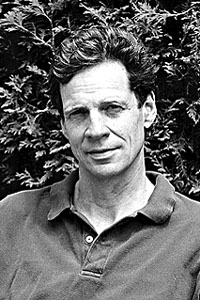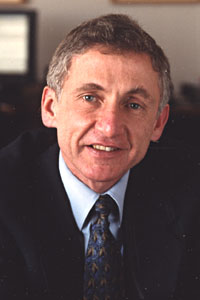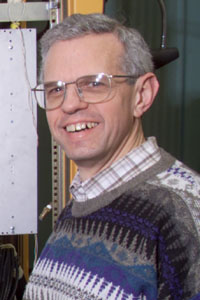Five faculty members elected as fellows of American academy
By William Harms, Steve Koppes, Jennifer CarnigNews Office
 Sheila Fitzpatrick  Susan Goldin-Meadow  Charles Larmore  Richard Saller  Melvyn Shochet | |
The American Academy of Arts and Sciences, founded in 1780 by John Adams, James Bowdoin, John Hancock and other scholar-patriots, has elected five Chicago faculty members as 2005 fellows. They are Sheila Fitzpatrick, Susan Goldin-Meadow, Charles Larmore, Richard Saller and Melvyn Shochet.
The fellows are elected to five classes: mathematics and physical sciences, biological sciences, social sciences, humanities and the arts, and public affairs, business and administration. American Academy of Arts and Sciences fellows conduct interdisciplinary studies in a broad range of disciplines.
Sheila Fitzpatrick, one of the nation’s leading scholars on the former Soviet Union, is the Bernadotte E. Schmitt Distinguished Service Professor in Modern Russian History.
Fitzpatrick, who joined the Chicago faculty in 1990, has had a distinguished career of research and is one of the founders in the field of Soviet history. She is the author of Tear Off the Masks! Identity and Imposture in Stalin’s Russia, which will be published in July.
A pioneer in the study of Soviet society in the 1930s, she has written several books, including Stalin’s Peasants: Resistance and Survival in the Russian Village After Collectivization and Everyday Stalinism: Ordinary Life in Extraordinary Times, Soviet Russia in the 1930s.
In 2002, Fitzpatrick received a Distinguished Achievement Award from the Andrew W. Mellon Foundation.
Prior to her faculty appointment in 1990, Fitzpatrick served as Regent’s professor of history at the University of Texas at Austin. She received her B.A. in 1961 from the University of Melbourne and her D.Phil. in 1969 from the University of Oxford.
Susan Goldin-Meadow, the Irving B. Harris Professor in Psychology, has done pioneering scholarship in the field of language-learning and cognitive development.
Goldin-Meadow, whose research focuses on the use and meaning of gesture, is president of the Cognitive Development Society and chair-elect for the American Association for the Advancement of Science’s Section on Linguistics and Language Science. She is the founding editor of Language Learning and Development and serves on the editorial boards of Cognitive Science, Cognitive Development and Gesture.
Goldin-Meadow, who joined the Chicago faculty in 1976, has published extensively on gesture. She has found, for example, that children who have never heard a language can nevertheless make up their own gesture language, and that people who are blind and have never seen gesture nevertheless gesture in much the same way sighted people do. Her work also has shown that students perceive information in math lessons that teachers convey unconsciously through their gestures.
She is the author of The Resilience of Language: What Gesture Creation in Deaf Children Tells Us About Language-Learning in General and Hearing Gesture: Our Hands Help us Talk and Think.
She received a B.A. from Smith College in 1971, and an M.A. in 1972 and a Ph.D. in 1975, both in psychology, from the University of Pennsylvania.
Charles Larmore, the Chester D. Tripp Professor in the Humanities, teaches in the departments of Philosophy and Political Science, as well as in the Law School. A leading moral and political philosopher, Larmore came to the University in 1997 after almost 20 years of teaching at Columbia University.
He has developed new understandings of the core principles of political liberalism, which he believes better fit the nature of modern pluralistic societies.
He also has written about the foundations of ethics and about the continuing importance of the romantic tradition. The author of three books related to liberalism—Pattern of Moral Complexity (1987), The Romantic Legacy (1996) and The Morals of Modernity (1996)—Larmore also publishes frequently in French and German.
He also contributes to such publications as the Journal of Philosophy, where he served on the editorial board from 1987 to 1996, and Ethics, of which he has been the book review and associate editor since 2000.
Larmore earned his A.B. in Greek and philosophy from Harvard University in 1972, and his Ph.D. in philosophy from Yale University in 1978.
Richard Saller, the Edward L. Ryerson Distinguished Service Professor in History and Classics, has been Provost of the University since 2002. Saller served as Dean of the Social Sciences Division from 1994 to 2002.
A Roman historian with special interests in social, economic and cultural history, Saller has written Personal Patronage Under the Early Roman Empire, Patriarchy, Property and Death in the Roman Family, and The Roman Empire: Economy, Society and Culture, a work that has been translated into five languages.
Saller received B.A. degrees in Greek and history from the University of Illinois in 1974 and his Ph.D. from Cambridge University in 1978.
After teaching at Swarthmore College for five years, he joined the Chicago faculty in 1984 as an Associate Professor.
Before becoming Dean of the Social Sciences Division, Saller served as Chairman of the Committee on the Ancient Mediterranean World in 1992 and 1993, and as Chairman of History in 1993 and 1994.
Melvyn Shochet is the Elaine and Samuel Kersten Jr. Distinguished Service Professor in Physics and the College.
Shochet is a member of the Collider Detector at Fermilab collaboration, in which scientists are studying high-energy collisions of subatomic particles with the world’s most powerful particle accelerator.
Shochet co-led the Chicago team that helped build two critical components of the upgraded CDF experiment, which began in 2001. He served as scientific co-spokesman for the 439-member CDF collaboration, which obtained the first direct experimental evidence for the top quark in 1994.
Shochet also is a member of the ATLAS collaboration at CERN, the European particle physics laboratory. The ATLAS experiment will begin when construction is complete on CERN’s Large Hadron Collider in 2007. Between 2001 and 2002, he was a member of a Department of Energy-National Science Foundation committee charged with developing a 20-year plan for the future of high-energy physics.
Shochet received his Ph.D. from Princeton University in 1972. He came to the University as a research associate in 1972 and joined the faculty in 1973.
![[Chronicle]](/images/sidebar_header_oct06.gif)